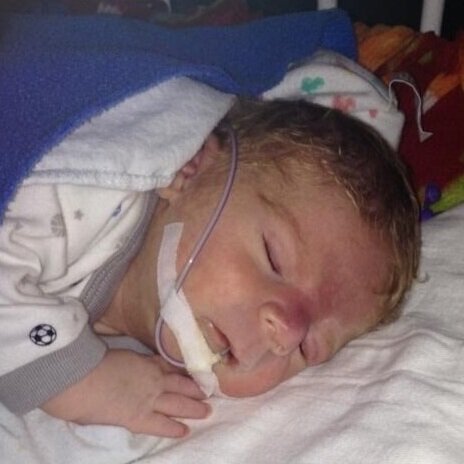Picture of Stacee’s son as an infant sleeping on blankets in a crib with a blanket over him and a tube in his mouth.
Being the parent of a child with complex health care needs and multiple disabilities is a journey of navigating medical, therapeutic, and educational systems. For me, this experience started with a long stay in the neonatal intensive care unit (NICU) with my son. We spent six weeks in a dark hospital room with beeping machines running around the clock, nurses and staff in an out, medical tests and procedures, and multiple surgeries. The first thing a doctor said to me when I walked into the NICU to see my son after he had been airlifted to the hospital was that this doctor suspected my son had a fatal genetic condition and would not live to be a year old. This trauma has stuck with me over the last six years as I watched my son grow into a happy-go-lucky, energetic, and loving six-year-old boy. Very few people understand the trauma that can be experienced during stays in the NICU and the lasting effects it can have on families. Providers who will be working with this population need to receive continued training on the use of trauma-informed practices.
A study conducted by Duke University found[KA1] [SL-S2] that, out of 30 mothers of premature babies who stayed in the NICU that were interviewed, all reported having at least one PTSD symptom such as increased arousal, avoidance, or flashbacks, while 12 mothers reported having two symptoms and 16 reported having three (Holditch-Davis, Bartlett, Blickman, & Miles, 2003; Tarkan, 2009). I have personally experienced these symptoms on and off for the last six years but did not understand what was going on until I recently read a blog post, titled We Need to Talk About PTSD in NICU Parents, which discussed the feelings of grief, fear, and anxiety that parents experience and the lasting impact this has over time (Ogilvy, 2017). Parents can remain in a constant state of hyperarousal, even after leaving the NICU because they are taking home a medically fragile child. This child may have medical devices, special feeding arrangements, seizures, or any number of health concerns. Family support may fade after returning home from the NICU and parents can find themselves feeling isolated and overwhelmed by their new responsibilities and lack of support (Tarkan, 2009).
Given this information, what steps can be taken to better support NICU parents? Some hospitals utilize a peer support model where current NICU parents receive support from former NICU parents. This can reduce anxiety and depression and increase social support for parents (Tarkan, 2009). Another suggestion is to have more hospitals focus on improving supports for parents after leaving the NICU, such as ensuring they are enrolled in EI services, have a local pediatrician, schedule upcoming medical appointments, and connect them to community resources such as family support groups. The utilization of the coordinated-care model, or medical home, could be a great way of extending the parental support network after families leave the NICU. If physicians and therapists are easily accessible and work collaboratively to serve an individual over the lifespan, families would have a consistent support network. Finally, providers serving this population of CYSHCN and their families should engage in trauma-informed care practices and do their best to be sensitive and supportive to families, while including them as valued members of the treatment team.
References
Holditch-Davis, D., Bartlett, T.R., Blickman, A.L., Miles, M.S., (2003). Posttraumatic stress symptoms in mothers of premature infants. Journal of Obstetric, Gynecologic, & Neonatal Nursing, 32(2), 161-71.
Ogilvy, C. (2017). We need to talk about PTSD in NICU parents. The Mighty, April 4, 2017. Retrieved from: https://themighty.com/2017/04/ptsd-nicu-moms/
Tarkan, L. (2009). For parents on NICU, trauma may last. The New York Times, August 24, 2009. Retrieved from: https://www.nytimes.com/2009/08/25/health/25trau.html
[KA1]Were these all mothers with babies with NICU stays. I would specify- Univerisity about …
[SL-S2]Yes, these were mothers of NICU babies.
Picture of Stacee’s son as a young boy in a blue t-shirt and shorts with sneakers on sitting on a picnic bench holding one leg with his arm and smiling.









